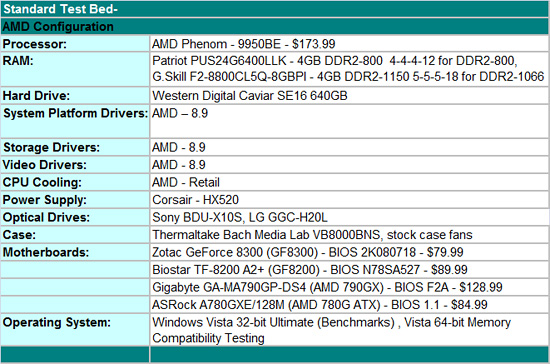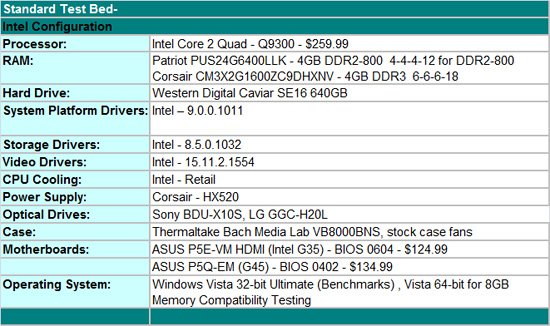The IGP Chronicles Part 2: AMD 780G vs. Intel G45 vs. NVIDIA GeForce 8200
by Gary Key on October 14, 2008 12:40 PM EST- Posted in
- Motherboards
AMD vs. Intel vs. NVIDIA: Fight
At the heart of AMD's 780G we have what AMD is calling a Radeon HD 3200 graphics core, providing the most powerful (on paper) integrated graphics on the market today. The table below should shed some light on the balance of power:
| AMD 790GX | AMD 780G | Intel G45 | Intel G35 | NVIDIA GeForce 8300 | NVIDIA GeForce 8200 | |
| Graphics | Radeon HD 3300 | Radeon HD 3200 | GMA X4500 |
GMA X3500 |
GeForce 8300 mGPU | GeForce 8200 mGPU |
| Core Clock | 700MHz | 500MHz | 800MHz | 667MHz | 500MHz Core / 1.5GHz Shader |
500MHz Core / 1.2GHz Shader |
| Shader Processors | 8 (5-way) | 8 (5-way) | 10 |
8 |
8 | 8 |
| Full H.264/VC-1/MPEG-2 HW Decode | Yes | Yes | Yes | No | Yes | Yes |
While Intel's G35, NVIDIA's GeForce 8200, and AMD's 780G all have 8 of what we're calling "SPs" or stream processors, their clock speeds and capabilities vary greatly from one to the next. Intel and NVIDIA are closest in this regard, as each SP has a peak throughput of a single instruction per clock. AMD's architecture is a bit more capable in the sense that each SP can have a maximum throughput of 5 instructions per clock. It gets a bit more complicated as NVIDIA has separate hardware for transcendental operations, which occupy one of the five "slots" in each AMD SP.
If you multiply it all out that gives Intel a throughput of 8 instructions per clock for G35, 10 for G45, 10 for NVIDIA's GeForce 8200 (where two are transcendental operations) and 40 for AMD. In terms of worst case throughput however, AMD falls down to 8 per clock (assuming the compiler can't feed the hardware 4 shader ops + 1 transcendental per SP) as does NVIDIA. This worst case rarely happens, but it is definitely worth noting.
Taking clock speeds into account, Intel really falls behind here. While G45 has a similar instruction throughput to NVIDIA's architecture, it runs its SPs at 800MHz while NVIDIA runs its at 1.4GHz giving NVIDIA a 75% raw performance advantage. AMD's core runs much slower at 500MHz, but the SPs are far more complex, so we end up with the following scenarios:
In the best case for AMD, the 780G is 43% more powerful than the GeForce 8200, but in the worst case NVIDIA's hardware is 1.8x faster than AMD's thanks to the clock speed advantage and AMD's dependency on ILP within an instruction stream. The integrated graphics race then becomes even more variable than how AMD/NVIDIA stack up with discrete GPUs; the swing from an AMD advantage to an NVIDIA advantage is much wilder than what we see with the GeForce GTX 260 vs. Radeon HD 4850.
The Test
Our Intel test bed today features the Q9300 quad-core processor and the AMD/NVIDIA platform features the Phenom X4 9950BE. Both of theses processor offers terrific performance with decent power consumption and thermals for the cost. Our Patriot DDR2-800 Viper 4GB memory kit has served us well for the past few months and we highly recommend it. We chose Corsair for our HX-520W power supply that has served us well in testing a variety of IGP solutions. Our favorite midrange HDD continues to be the Western Digital SE16 640GB that provides the near perfect balance of price, performance, and capacity.
Our motherboard selection represents a small cross section of IGP products based on the Intel G35/45, AMD 780G, and NVIDIA GeForce 8200/8300 products. While we tested over fourteen motherboards for this article, we're using the results from the best of the best for each chipset.












41 Comments
View All Comments
MrMilli - Tuesday, October 14, 2008 - link
If you multiply it all out that gives Intel a throughput of 8 instructions per clock for G35, 10 for G45, 10 for NVIDIA's GeForce 8200 (where two are transcendental operations) and 40 for AMD. In terms of worst case throughput however, AMD falls down to 8 per clock (assuming the compiler can't feed the hardware 4 shader ops + 1 transcendental per SP) as does NVIDIA. This worst case rarely happens, but it is definitely worth noting.10 for nvidia => 8 for nvidia
AMD falls down to 8 per clock => to 10 per clock
a1yet - Tuesday, October 14, 2008 - link
wow finally a video playback comparison :-) TYI have a question one of you may be able to answer ?
In the "Hardware Accelerated Blu-ray Playback Comparison"
(CPU usage) the 780 beat the 790 in 3 of the 6 tests!
With the 790 using up to 9% MORE CPU usage, and in the
other 3 tests. The 790 beat the 780 by only .3% (well within a margin of error)
Up to 9% MORE CPU usage is A LOT!
I want to buy the 790 but this is a disappointment!
Dose anyone know why the 790 uses so much more CPU then the 780.
Is it's HD Acceleration sub-par ?
Heck in the "Crank DB" test all the cards beat the 790.
Please help TY
yknott - Tuesday, October 14, 2008 - link
Do we know if the Radeon HD4xxx cards support output at 1080p/24fps?I did some googling and can't find anyone who can verify this
Geraldo8022 - Tuesday, October 14, 2008 - link
"do we know if the Radeon HD4xxx cards support output at 1080p/24fps?"this is exactly what I want to know also.
Screammit - Wednesday, October 15, 2008 - link
I just received a 4670 today to plug into my old PC that i'm slowly converting into an HTPC. In the display modes 1080p/24 is natively listed, but i'll have to get my blu ray drive in before I can truly verify that it works. Sure seems to have support though.Calin - Tuesday, October 14, 2008 - link
An Intel processor and chipset with an AMD discrete cardSkCom - Tuesday, October 14, 2008 - link
testing amd ddr 2 and intel ddr 3 is not fer test and amd made the 780 790 for usage with cheap cpu SEMPRON so why use phenom and rise the w power when simply can do the chep cpu psu ram and stillwatch HD movies surf and dissant gaming price perfom AMD 1 CHAMPION
strikeback03 - Tuesday, October 14, 2008 - link
Checked twice, can't find any punctuation in this post. I have no idea what you are trying to say.fic2 - Tuesday, October 14, 2008 - link
Apparently using a Sempron takes away your ability to punctuate, spell check or make much sense.Clauzii - Tuesday, October 14, 2008 - link
He says that by using a Sempron CPU (lower watt than Phenom), it would still be a nice machine for most people, and still be good for movies.